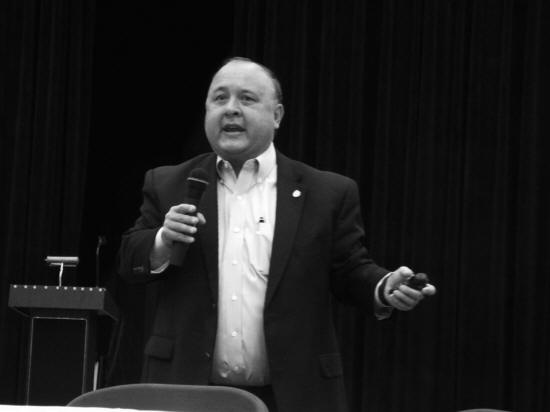|
 Logan County Farm Bureau President David Opperman
welcomed everyone and opened with a prayer thanking God for the
meal, the new life of crops or livestock, and for opportunities
given to us. He asked God to be with families in Nebraska
experiencing severe flooding and give them strength to get past this
challenge. Logan County Farm Bureau President David Opperman
welcomed everyone and opened with a prayer thanking God for the
meal, the new life of crops or livestock, and for opportunities
given to us. He asked God to be with families in Nebraska
experiencing severe flooding and give them strength to get past this
challenge.
On a recent drive through Colorado, Opperman said he looked around
and realized people in Illinois live on some of the best farmland.

Opperman thanked everyone for coming and Lincoln
College for providing the space and the dining services for the
breakfast. He also thanked Jim Drew of Samantha Nagraki of the Logan
County Farm Bureau for putting much of the program together, Abby
Coers for setting up the PowerPoint, and ALMH for being the main
sponsor in addition to many others who made the breakfast possible.

Opperman recognized state representatives, county board members and
award-winning farmers Bill Sahs and Derek Martin. Sahs was recently
chosen as Prairie Farm National Farm Award winner, one of four
master farmers in the state, and Martin was chosen as National
Outstanding Young Farmer.

Lincoln College President David Gerlach briefly spoke
about the school being in a fantastic transition as it gets back to
its four-year roots. Lincoln College is now offering ten different
bachelor’s degrees and hopes to soon offer a Bachelor of Law, Master
of Business Administration and Master of Organizational Leadership.
The school plays a role as a county economic developer and has a $43
million annual economic impact in the county.

This year’s keynote speaker was Texas FFA Executive
Director Aaron Alejandro. Alejandro helps businesses, organizations,
education and youth clubs improve organizational skills. He also has
many years of experience in management, personal and professional
training.
Alejandro thanked Mike Maske for inviting him to be there.

Alejandro has been a member of the Texas Farm Bureau since 1988 and
said he loves agriculture and young people. His primary message to
the Logan County farm community on Thursday was to compete for the
future, and he shared ideas for getting there.
He said if you are average, agriculture is not for you because
agriculture needs extraordinary people to meet extraordinary
challenges that are everywhere in agriculture.
One quote Alejandro said he always shares is that the philosophy of
the schoolroom in one generation will be the philosophy of
government the next. The philosophy in schoolroom is the way we will
govern it in the next, and Alejandro asked if we like where we are
at right now.
Hurricanes, tornadoes and floods make headlines, but Alejandro said,
you never hear the media talking about termites, which destroy more
homes than any of those others and they do it little bite by little
bite. He believes success works the same way as we compete for the
future.
Kids can learn just as much at a grocery store as a museum.
Alejandro said you just have the right person to show them around.
Some people watch things happen, some people make things happen and
other people wonder what the heck happened; but Alejandro said we
have got to get in the game and compete for attention.
Alejandro told stories about his childhood. When he was growing up
in Dallas, Texas, his dad moved out and down the street when he was
six, and then died when Alejandro was 10 years old. It was the 70s
and Alejandro grew his hair long and began getting into a lot of
trouble. Alejandro’s mom sent him to a boys’ ranch in Amarillo,
Texas in 1980, where he had to take a vocational program.
Skills USA, where they built houses and worked on
cars, was what Alejandro chose; but his dorm dad Mr. Chandler placed
him in Future Farmers of America instead. Alejandro was mad at God
for two years and had a serious pity party.
[to top of second column] |

Alejandro went to a leadership workshop at 16 years old and an
FFA state officer asked Alejandro what he would do with his life when he
graduated in a couple of years.
Graduating in 1984, Alejandro said he scored 14 on the ACT and
when he told his mom he wanted to go to college, she wrote him a check for $25.
Alejandro was told his future was up to him and not tied to a test score or his
parents’ income. The FFA jacket helped Alejandro get to his future because when
the jacket was zipped up, he looked like everyone else and no one knew all he
had gone through.
Alejandro had the same opportunities as anyone else and decided to do something
with that. He was elected president of FFA for the whole Texas Panhandle. When
he was selected, Bill Bennett, Dean of Texas Tech University, told Alejandro,
“If you come to Texas Tech, I will give you a chance.”
One scholarship soon turned into five scholarships and Alejandro’s education was
paid for.
Opportunity was another area Alejandro said is important. He remembers his mom
crying out and praying for food and asking God to give her son an opportunity.
When Alejandro was later working at a Mexican orphanage and asked their need, a
nun said she prayed the kids would have opportunities.
Alejandro said this breakfast was giving kids a chance and thanked sponsors,
parents, and stakeholders who are making this country better by giving a young
person with a “want to” some opportunities. His Texas FFA gives out 2.3 M in
academic scholarships.
Alejandro asked, what makes “ag folks” unique? And he answered: the respect,
responsibility and resiliency taught in FFA is what this country needs to get
back on track.
He remembers having to go out to water horses during a blizzard that he did not
want to be out in, but was reminded the horses get thirsty just like people do.
Alejandro said in agriculture, if people do not do their job, something dies.
Soon an economy may die, then people may die.

When talking about why to compete, Alejandro said that 50 percent of the world’s
population is under the age of 30, and we live in an age where celebrities like
Justin Bieber, Britney Spears and Lady Gaga have more Twitter followers than the
population of five countries. If they come out and say we are going to have
meatless Mondays, dairy is not good for you, or make other remarks about food
and people are following them, but you are not part of the dialogue, you are
losing the debate.
We have got to get into the game and become part of the dialogue or accept what
someone else says. Alejandro said in 31 years, the world will need 80 percent
more food than it does today, so there are tremendous opportunities ahead.
Early adopters use technology from a young age, and many get news from social
media. Social media is the number one source of food information and Alejandro
said 60 percent of adults log in to Facebook every day. In “user generated
content,” where people follow each other on social media and someone “likes,
shares, comments” on something posted, it is like a virtual high five. Alejandro
said posting on social media is good as it is a social platform that allows
people to be part of the dialogue and engage 70 percent of an audience that does
not understand agriculture.
One thing Alejandro said we need to do is to “jump into” the food and
agriculture dialogue.
Alejandro told the story of Eric “the Eel” Moussambani, who represented
Equatorial Guinea in the Olympics after learning to swim in a lake and small
hotel pool. Moussambani saw an Olympic sized pool for the first time at the 2000
Olympics and just stood there when the starting gun went off for the 100 Meter
freestyle, so the crowd yelled at him to jump in. The others in his heat were
disqualified for false starts and Moussambani was the only one left. Moussambani
won his heat even though he flailed around and dog paddled. He has an Olympic
record for the slowest 100 M freestyle just because he jumped in.

Alejandro said we need adults to jump into the dialogue and young people to
compete for their futures. To know what the future is, we need to grow it.
Empowering kids by giving them scholarships can make them mentors, teachers,
sponsors, or college professors because of the opportunities they were given.
At a boot camp, Alejandro talked to a gang member who was in tears. The gang
member said he would give anything just to hear someone was proud of him.
Alejandro finished by telling the kids in FFA, “We are proud of you,” and “Go
out and tackle your future.”
[Angela Reiners with photos by Nila Smith] |